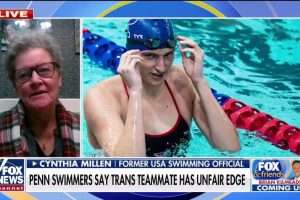NCAA swimming chooses inclusion over integrity, fairness

NCAA ‘erasing women from sports’ by allowing transgender competitors: Former USA Swimming official
Former USA Swimming official Cynthia Millen calls for rules to change to ensure fairness in women’s sports amid transgender athlete controversy.
I have been the head swimming coach for women at the same institution for 20 years and have professionally coached all of my adult life for over 35 years. I have personally seen the benefits as a coach and father of Division I women student-athletes.
The opportunities presented to these women through Title IX to attend a respected university, earn scholarships, learn how to work as a team, find out what they are really made of when adversity strikes, and to benefit from the accolades bestowed upon their success and participation creates leaders and is life changing.
This year the NCAA and the Ivy League made a calculated decision to prioritize the inclusion of a trans woman, Lia Thomas, over all other biological women athletes. The NCAA failed to act when they saw this coming and later deferred to USA Swimming and specific sport governing bodies to create policy. The Ivy League silenced dissent among student-athletes and circled the wagons to protect one student-athlete at the expense of many student-athletes. Overwhelming public response has not been favorable to these decisions.
At this time, NCAA President Mark Emmert, appears to be doubling down support for the opportunity for transgender student-athletes to compete, and adds, “while balancing fairness, inclusion and safety for all who compete.” Is that as rules as currently written that allowed for Lia’s eligibility or is that adopting various sports governing bodies rules for defining inclusion, fairness and integrity? Emmert goes on to say, “the NCAA Board of Governors expects all student-athletes to be treated with dignity and respect.”
My question to the NCAA Board of Governors is, “Do you think the NCAA is treating biological women student-athletes with dignity and respect”?
I was at the NCAA Women’s Swimming and Diving Championships, March 16-19, along with nearly 400 athletes and several thousand swim fans and family and media, the overwhelming majority of whom were very respectful to each other and to Lia Thomas. Literally every comment I heard from coaches, fans and athletes at the championships started with, “I support Lia being who she wants to be,” and then follows, “but, competing against biological women is just not fair.”
The question is, how does sports include transgender athletes, but also not diminish biological women’s opportunities?
Before and after the NCAA Championships a number of student-athletes, Erica Sullivan, Brooke Forde, Reka Gyorgy, Riley Gaines, all stated they support Lia as a person. All were affected negatively in the standings and final places, which otherwise would not have happened had the NCAA truly been assuring fairness and integrity in these championships.
The frustration, disappointment and loss of opportunity for student-athletes in attendance was clearly visible and the impression many coaches and spectators had of the NCAA was, “Quit complaining, this is the way it is.”
Exercising the legal rights of the transgender community in the workplace, the classroom and socially is acceptable, fair and creates equal opportunity as Title IX intended for all. It is the way in which a respectful and free society should be created, providing everyone equal opportunities to learn, grow and thrive and be free of discrimination.
Our educational institutions have led the way in providing this environment, but the NCAA has gone too far. When transgender inclusion into women’s sport takes opportunities away from the very individuals Title IX exists to ensure safe and fair opportunity, then the boundaries of transgender inclusion need to be revisited. The question is, how does sports include transgender athletes, but also not diminish biological women’s opportunities?
The NCAA, International Olympic Committee and many governing bodies have yielded the integrity of sport to progressive activists’ demands on inclusion. Rules that govern sports have become clouded and leave too much room for abuse and disruption of the fairness and safety of competition. Sports by their very nature depend on strict guidelines of rules and policies to ensure that competitions and competitors all have a fair and equitable opportunity to participate and win.
Denying, dismissing or minimizing the physiological benefits from androgynous growth during male puberty and then saying those differences can be mitigated medically in a time span as short as one calendar year is simply placing the agenda of inclusion over current scientific research and the integrity of sport. In effect, current rules say biological women don’t matter.
The people of the United States are a very tolerant and forgiving people. Our democratic republic, originally founded on the limited role of government, allows for the freedom of choice on which liberalism is founded. Over time the United States has corrected course, righted wrongs and stood up for the oppressed. Inclusion, opportunity and the pursuit of happiness are in our nation’s DNA.
Comments I heard at the NCAA Championships reflect this cultural phenomenon of celebrating an individual’s freedom of choice. But the freedom of choice that we enjoy should not come at the expense of others.
Source: Read Full Article




